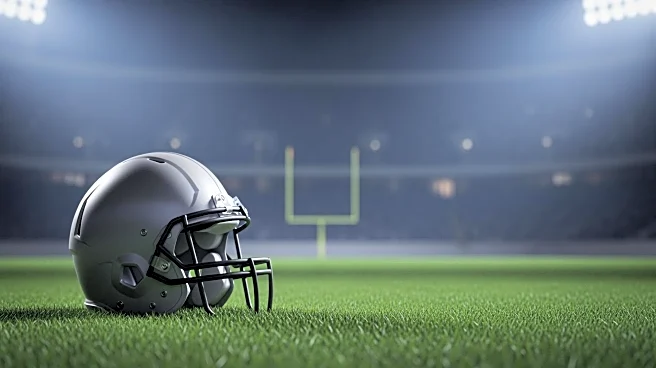What's Happening?
Dallas Cowboys defensive end Marshawn Kneeland was found dead early Thursday morning in Frisco, Texas, from an apparent self-inflicted gunshot wound after crashing his vehicle following a police chase, according to the Texas Department of Public Safety.
Kneeland, who was 24 years old, was involved in a pursuit initiated by officers at 10:33 p.m. local time when he refused to stop his vehicle. The chase was terminated after DPS troopers lost sight of the car, which was later found abandoned following a crash on Dallas Parkway. Kneeland fled the scene on foot and was discovered deceased at 1:31 a.m. The Cowboys expressed their deep sadness over Kneeland's passing, highlighting his role as a beloved teammate. Kneeland was in his second season with the Cowboys, having been drafted in the second round of the 2024 NFL Draft.
Why It's Important?
The tragic death of Marshawn Kneeland has significant implications for the Dallas Cowboys and the broader NFL community. Kneeland's passing marks the first instance of an active NFL player dying during a season since 2018, underscoring the emotional and psychological pressures faced by professional athletes. The incident has prompted the NFL Players Association to emphasize the importance of mental health support for players, highlighting the need for comprehensive welfare checks and support systems within sports organizations. Kneeland's death also raises awareness about the mental health challenges athletes may encounter, potentially leading to increased advocacy and resources dedicated to player well-being.
What's Next?
In the wake of Kneeland's death, the Dallas Cowboys and the NFL are likely to review their mental health support protocols and player welfare measures. The NFL Players Association has already expressed its commitment to ensuring players receive necessary support, which may lead to enhanced mental health initiatives across the league. Additionally, the Cowboys will need to address the impact of Kneeland's absence on their defensive lineup, potentially adjusting their roster and strategies for upcoming games. The incident may also prompt broader discussions within the sports community about the pressures faced by athletes and the importance of mental health awareness.
Beyond the Headlines
Kneeland's death highlights the complex interplay between mental health and professional sports, raising ethical questions about the responsibilities of sports organizations in safeguarding their players' well-being. The incident may catalyze long-term shifts in how mental health is prioritized within the NFL, potentially influencing policies and practices across other sports leagues. Furthermore, Kneeland's passing serves as a poignant reminder of the personal struggles athletes may face, encouraging a cultural shift towards greater empathy and understanding of mental health issues in sports.

















